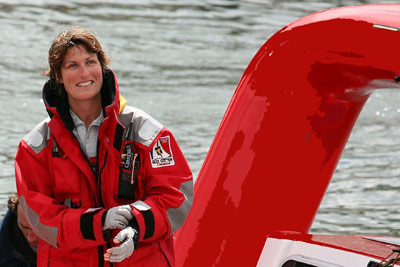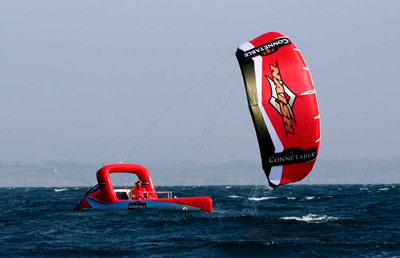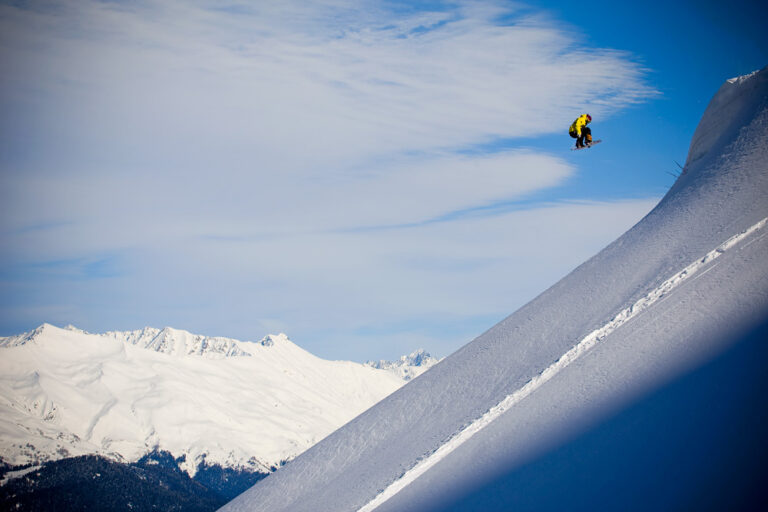Have you always enjoyed watersports?
Yes, I’ve always enjoyed watersports, ever since I was a child.
Where did your passion come from?
From my father who is a sailor and made the whole family sail when we were kids.
When did you decide to turn your passion into a career?
Six years ago I crossed the Atlantic Ocean solo from the Canary Islands to West Indies. I never thought it would lead me to another challenge then, but it turned a light on in my mind and I realized then that I feel right where I want to be when I’m in the sea.
How does it fee to be the first woman to have rowed the Atlantic Ocean solo?
I am the first woman to have rowed the Atlantic solo, both ways to be exact, and truly it doesn’t matter to me. What matters to me is that I enjoyed doing so and those two voyages taught me incredible things.
And if that wasn’t enough, you’re also the first person to have crossed the Atlantic Ocean’s northern route on an OceanKite. How would you describe that experience?
Kiting solo across the Atlantic Ocean northern route was quite an amazing challenge as it was the first time it had been attempted so there was no previous experience I could rely on. But my team and I worked for two years to make this adventure happen and it never occurred to me that I wouldn’t make it safe and sound since we really worked hard on safety before anything else.

How did you prepare for those challenges?
It usually takes about two years to prepare for such challenges. First of all, the testing of the equipment takes quite a long time. Then there is a great part of physical training and mental preparation too. Everything is prepared with great seriousness and I rely very much on my previous challenges when working on the next one. Such voyages are so personal, I don’t think there is a general rule how to handle those, but I like to be a part of each step the challenge takes. So far it has helped me to fix different problems that occurred when I was alone at sea and couldn’t count on anybody else’s help.
It must get pretty tough out there at times, what keeps you going?
Passion, motivation and a certain idea that all dreams can come true if we really want to make them happen. Such challenges require a great amount of work, and people who commit to helping out for days and days beforehand then count on me when at sea to fulfill their dreams. I cannot give up because of some setback when I know from the beginning that it will be tough – I am not simply leaving for a nice vacation at sea!
Where is your favourite place to practice?
The Bay of La Forêt Fouesnant, Brittany, France.
Is there anywhere else in particular you would like to conquer?
I have no intention to conquer anything… I just travel the ocean and don’t intend to leave any print where I pass.
Have you had any career setbacks?
Not really, I just keep going my way and if it doesn’t go in the direction I intended to go, then I try to find another way.
What affect does your passion and career have on your personal life?
My passion only affects my personal life in a good way. It helps me to focus on what is essential, to try to understand people around me and to be more careful to what is going on around me.

What interested you about the BLUE Project?
The idea of respecting the environment we live in seems obvious to me, but I came to realize that it wasn’t like that for some people, simply because no one ever taught them about how dangerous we can be to nature if we don’t pay much attention to it. I know through the BLUE Project we can educate a lot of people.
Do you think the amount of time you spend in the ocean is the reason behind your passion for the environment?
Probably so, but I was born in a family where environment has always been a great concern. My grandma on my father’s side created an association in the 70’s to protect the coast along the shore of Mousterlin, Brittany, France. We grew up with this strong idea that environment needed to be taken care of.
How have you spent much time with the rest of the BLUE ambassadors?
Unfortunately I am far from most of the other ambassadors. The only person I meet sometimes is Sam Davies since she trains in the same spot I do.
Do you have any continuing plans after the project?
I always have plans but I always wait till I come back on dry land, I’ll always finish one project before starting another one. One at a time is just fine.
What would you like to personally achieve from this experience?
I would like to achieve a standard by which my future challenges can be built and measured.
What else can we expect from you in the near future?
A little relaxation after my challenge and the pursuit of my passion as long as I will be able to do it.


